Switzerland
The UN human rights chief addressed Tuesday (Sep. 12) the 54th session of the Human rights council in Geneva.
He told the assembly that testimonies from people who had escaped the violence in Sudan underscored the scale and brutality of the conflict between the Sudanese Armed Forces (SAF) and the Rapid Support Forces (RSF).
“This Friday, Sudan will mark five months of futility," Turk said speaking in Geneva.
"Five months of futile suffering, death, loss and destruction. Since the conflict began, the people of Sudan have been caught up in an endless cycle of violence generated by the Sudanese Armed Forces (SAF) and the Rapid Support Forces (RSF). There is no reprieve in sight.”
Turk's office travelled to Chad and Ethiopia in June and July to gather first-hand information from people who had fled the violence in the country.
Turk said both sides of the conflict had repeatedly failed to investigate serious human rights violations and violations of international humanitarian law despite promising to do so, and that no one had been held to account.
Sudan has been rocked by violence since mid-April, when tensions between the country’s military, led by Gen. Abdel Fattah Burhan, and the paramilitary Rapid Support Forces, commanded by Gen. Mohamed Hamdan Dagalo, burst into open fighting.
Indiscriminate shelling
Indiscriminate shelling and airstrikes by both factions are not uncommon in Sudan's war, which has made the Greater Khartoum area a battleground.
The conflict has since spread to several parts of the country. In the Greater Khartoum area, which includes the cities of Khartoum, Omdurman and Bahri, RSF troops have commandeered civilian homes and turned them into operational bases. The military responded by bombing these residential areas, rights groups and activists say.
In the western Darfur region — the scene of a genocidal campaign in the early 2000s — the conflict has morphed into ethnic violence, with the RSF and allied Arab militias attacking ethnic African groups, according to rights groups and the United Nations.
The war has killed more than 4,000 people, according to August figures from the United Nations. However, the real toll is almost certainly much higher, doctors and activists say.
The number of internally displaced persons has nearly doubled since mid-April to reach at least 7.1 million people, according to the UN refugee agency.
Another 1.1 million are refugees in neighboring countries, according to figures released last week by the International Organization for Migration.
Chad received about 465,000 refugees, mostly from West Darfur province where the RSF and its Arab militias launched scorched-earth attacks on non-Arab tribes in the provincial capital of Geneina and its surrounding areas, according to the U.N. and rights groups.
Turk said that, the humanitarian efforts had either been blocked or attacked, with at least 19 humanitarian workers killed and several missing. He called for an end to attacks and urged authorities to allow the safe passage of humanitarian aid.




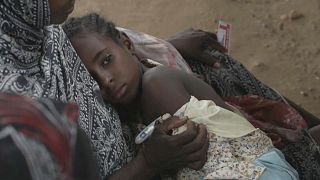
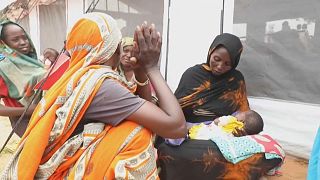
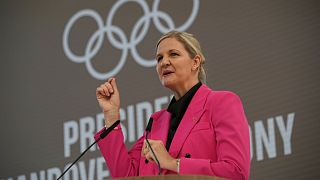
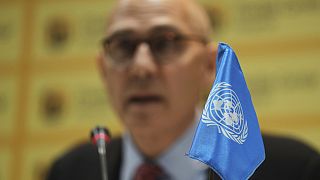
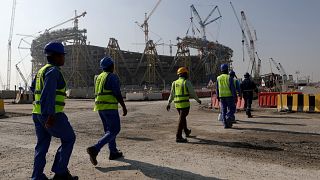



01:49
Sudanese refugees in Chad face deepening humanitarian crisis
01:11
Sudan: U.S. sanctions over alleged chemical weapons use come into force
01:39
Driven to starvation, Sudanese eat weeds and plants to survive
00:47
Sudan’s leader approves seven-day humanitarian ceasefire in El-Fasher
Go to video
UN warns of escalating humanitarian catastrophe in Sudan amid ongoing conflict
01:56
Sudan war fuelled by external arms flow to the country